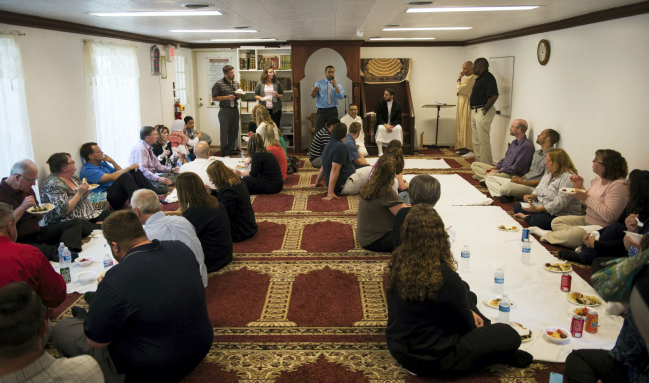 The Lebanon School District in Pennsylvania made news this month because during a work day fifty of its staff attended a local mosque to learn about Islam, eat Middle Eastern food, and watch local Muslims pray. (As far as I could tell, none of the educators joined in the prayer.) I understand the outrage over the double standard—as in, “Being in a religious service doesn’t violate church-state boundaries if it is a religion other than Christianity; it just promotes cultural understanding.”
The Lebanon School District in Pennsylvania made news this month because during a work day fifty of its staff attended a local mosque to learn about Islam, eat Middle Eastern food, and watch local Muslims pray. (As far as I could tell, none of the educators joined in the prayer.) I understand the outrage over the double standard—as in, “Being in a religious service doesn’t violate church-state boundaries if it is a religion other than Christianity; it just promotes cultural understanding.”
I realize that it is unlikely that school officials will now designate work days for school staff to spend time at worship services in a Catholic church, a Lutheran church, a Baptist church, and the other 53 Christian denominations in Pennsylvania to promote cultural understanding.
However, rather than pile with on more of the how-dare-schools-reach-out-to-Muslims theme, I suggest we give the school district some credit for at least engaging a portion (albeit a minor, minor, minor portion) of the faith community. (In the Lebanon School District, Muslims make up 1.8% of the student population, and statewide, Muslims are 0.6% of the population.)
We can look at it as the starting point for a larger and, frankly, more important conversation. We need to help school officials around the country understand that religion can be a very positive force in students’ lives. And while they might feel more comfortable and multicultural in starting with minority religious faiths, they need to see that local churches can be tremendous allies in helping produce what school officials are measured by most: academic success.
We all want our students to be successful academically and behaviorally. Research has shown that religion has a positive effect on these goals. Religion is not some arbitrary addition to academics; it is an important part of academic growth.
Studies indicate the positive influence of religion in students’ lives. For instance, Dr. Willem Jeynes of California State University, Long Beach, in his research (involving 4,458 students) on “The Effects of Religious Commitment on the Academic Achievement of Urban and Other Children” found:
“The results indicate that religiously committed urban children performed better on most academic measures than their less religious counterparts, even with controlling for socioeconomic status, race, and gender.”
The journal, Mental Health, Religion & Culture, in 2007 published a study involving over 7,500 children. The study, entitled the “Relationship Between Family Religious Behaviors and Child Well-being Among Third-grade Children,” concluded:
“…family attendance at religious [or] spiritual programs was significantly correlated with improved child health, vocabulary, reading, math, and social skills.”
The religious orientation of students is beneficial to schools in their quest for academic success and they should not merely tolerate it; they should engage it. Unfortunately, because of educators’ misunderstanding of the “separation of church and state,” they do the exact opposite. Thinking they must make their classrooms religion-free zones, they ignore and even ban from the classroom what research shows us is an important learning asset for students – their religious faith.
In Lebanon, PA, just like almost every other school district in America, the majority of religious students in public schools are Christians. Since there is a connection between a students’ religious involvement and academic success, educators need to get much better at publicly welcoming and affirming Christian students’ religious thinking in class.
When Johnny expresses a religious perspective about a topic in class, rather than shut him up and bark the mantra “separation of church and state,” his teacher needs to realize Johnny is, to use education jargon, connecting life to learning. When Sally says that her opinion about an issue in the news is based on her religious convictions, the teacher should welcome the fact that she is linking her culture to real-world application. And when Miguel writes about his dependence on God for facing trials, the teacher should affirm his social-emotional development.
I don’t think the educators in Lebanon, PA, were motivated by the idea of promoting Islam, but were simply motivated by a desire to create a more welcoming, understanding, and responsive learning environment for their Muslim students. Now we just need to help them, and many of their colleagues across the country, do the same for the Christian students in their schools.
